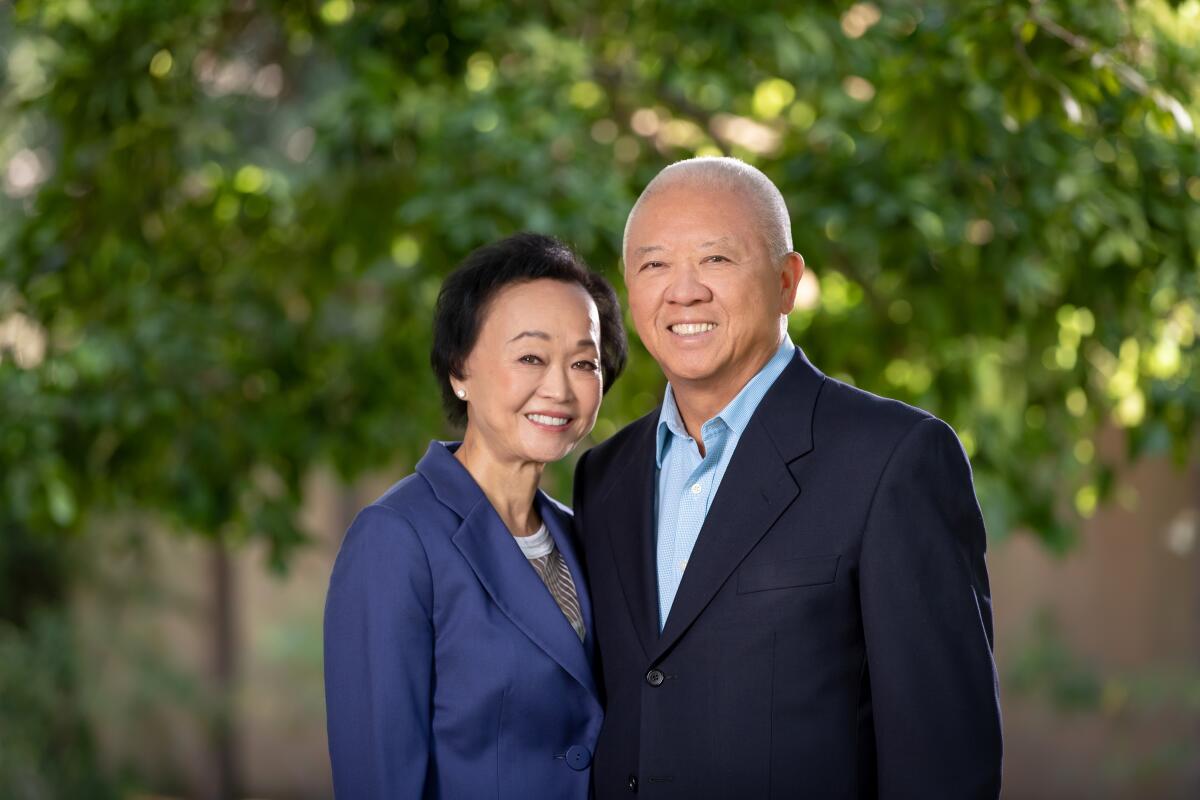Panda Express founders donate $100 million to City of Hope for alternative cancer care

Chinese food has been an American favorite for well over 100 years, but it wasn’t until the success of Panda Express that the cuisine became a staple at seemingly every suburban mall.
Now, the chain’s founders, Peggy and Andrew Cherng, are looking to transform how Americans undergo treatment for cancer, drawing on traditional Chinese medicine, acupuncture and other Eastern healing methods.
The billionaire couple, who opened their first Panda Express 40 years ago in Glendale, have donated $100 million to advance integrative care at City of Hope. The donation, announced Tuesday, is the single largest gift for cancer care received by the Duarte-based center.
The gift will establish the Cherng Family Center for Integrative Oncology, which will have a mission to weave integrative care into the services received by patients often undergoing chemotherapy, radiation and other conventional cancer treatments — but also to pioneer new evidence-based integrative therapies and to train a new generation of oncologists to offer them at other institutions.
The gig: Peggy Cherng, 66, is co-chair and co-chief executive of Panda Restaurant Group, one of the most recognizable Chinese restaurant chains in the world.
“We are thinking about how to be able to bring in Eastern medicine and combine it with Western medicine so we will be having the best of both worlds, and that will require a lot of research, education and training to be done,” Peggy Cherng, 74, said in an interview.
The donation is the largest so far made by the couple’s Panda Charitable Family Foundation. The Cherngs have previously given more than $5 million to City of Hope, with the majority funding research in natural-based remedies. That includes baicalein, a compound found in a traditional Chinese medicinal root that shows promise inhibiting various cancers, and white button mushrooms, which are being studied in Phase 2 clinical trials to determine whether they can slow prostate cancer.
“Our vision is to create an international destination for integrative oncology that transforms the way people receive cancer care,” said Dr. Edward Kim, City of Hope’s vice physician in chief.
The donation grew out of discussions the Cherngs had with Kim and Dr. Richard Lee, who was hired 18 months ago to run City of Hope’s integrative oncology program.
Lee said he has already received a National Institutes of Health grant to study the treatment of chemotherapy-induced peripheral neuropathy — damage to nerves in the hands and feet — with cannabis. He said the gift will enable the center to conduct rigorous clinical trials on any number of plant extracts.
“I think natural products are an important source of medicines that we can develop to help not only treat cancer, but support patients through the entire journey — but it has to be evidence-based,” he said.
About 40% of cancer patients use integrative therapies such as massage, acupuncture, meditation and herbal supplements, according to a study cited by City of Hope. But integrative care is not offered by all cancer centers, nor has it become a routine part of care.
“I think where the field of integrative oncology has not been as rigorous as maybe it should be is conducting these larger studies to really show the differences between cause and effect,” Kim said. “And that’s why you don’t see them appearing on the standard guidelines of clinical practice that exist.”
City of Hope, which has expanded its Duarte campus over the decades, started offering outpatient services in Irvine last year and will open a new hospital there in 2025. It also last year finalized its acquisition of Cancer Treatment Centers of America, giving it a national footprint.
City of Hope Chief Executive Robert Stone said that prior to the expansions, the cancer hospital was treating about 90,000 patients annually and conducting some 1,000 clinical trials. This year, he expects its patient count to be well above 200,000.
“Designing trials and running trials that get to answers faster, learning from what comes from the trials and applying it back to the clinic — that’s what we do,” he said.
The Cherngs moved to Las Vegas in 2014 but the Panda Express chain remains based in Rosemead. They are co-CEOs of the chain, which has more than 2,300 outlets, generating some $3 billion in sales. Forbes estimates the couple’s net worth at $3.1 billion.
The Cherngs have now given away $211 million through their Panda Charitable Family Foundation. The company’s Panda Cares Foundation, funded through in-store donation boxes, employees and others, has raised more than $329 million, with an emphasis on youth and community philanthropy.
The Cherngs’ first brush with City of Hope was 40 years ago, when Andrew Cherng’s father was treated for lung cancer. Since 2007, the hospital has been the beneficiary of Panda Cares’ annual golf tournament, while the couple’s personal foundation started funding natural therapies research at City of Hope in 2014.
Andrew Cherng, 76, said he hopes the latest gift will result in a big step forward for integrative care, which he thinks has suffered from a lack of trustworthiness.
“This effort is going to help formalize what is available out there with Eastern medicine, Chinese herbs and acupuncture and the various other treatments,” he said. “I think the City of Hope really gives credibility to what is out there.”
More to Read
Inside the business of entertainment
The Wide Shot brings you news, analysis and insights on everything from streaming wars to production — and what it all means for the future.
You may occasionally receive promotional content from the Los Angeles Times.











